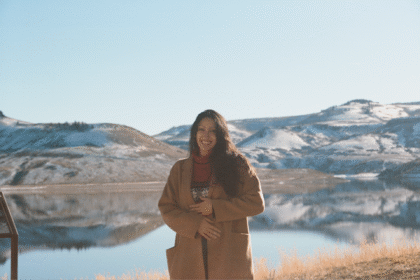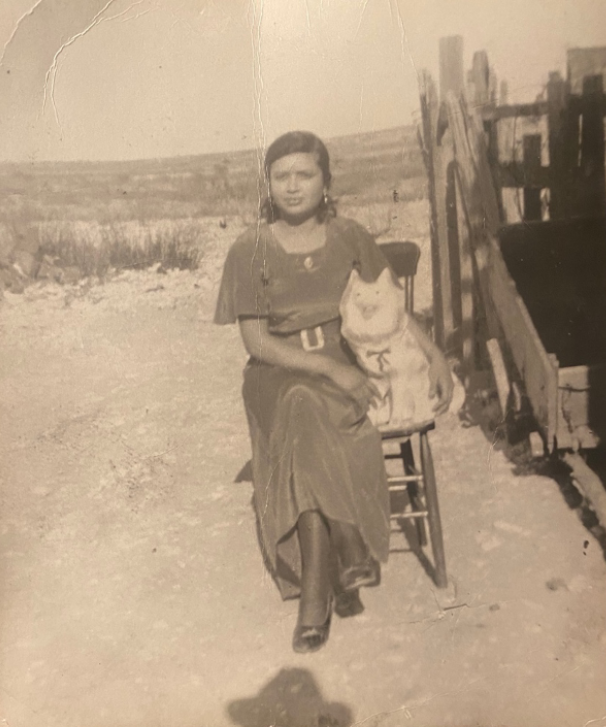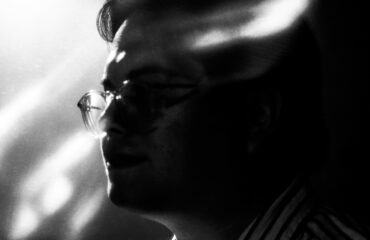
Like most divine relics I own, I have no memory of where my keychain came from. Was it college, high school, earlier than that? Joined in a loop to my home, my shed, my office, is a tarnished pewter scroll with a miniature relief of the Antigua Basilica de Guadalupe, windows tiny dashes below its crested rooftop. Behind the basilica, on the other side of the scroll, is an egg—poured resin the size and amber color of an immature desert beetle. If you look closely, into the body, there is an image of Our Lady of Guadalupe. The Virgin Mary? I suppose. Dusky face, head turned slight. At the bottom of the scroll, a raised script says, Virgencita Cuidanos. How funny that is. That way of saying it in Spanish. Not Virgen—Virgencita. The emphatic diminutive. How it calls upon a little virgin to look after us. Or no. A more tender virgin? A virgin so familiar as to be called upon as intimate?
§
My mother, in an idle moment, will sometimes pinch my breast. Snapping her arm out, almost as if milking a nipple once and quick, but just to the side of it, on the fleshy part, enough to suggest I watch out, that she might have really done it if she wanted to. She will squeeze any lump of fat, lift a shirt to expose a stomach, or stick a finger in an armpit and run away like a child playing tag, ravished by delight.
Where did this come from? My father maintains she wasn’t always this way. Suggests that with time she is becoming more cunning, more physical of humor, more like her mother. To which my mother balks. But when he asks, Is that a bad thing, to be like your mother? she replies on edge, No, my mother was a saint!
Once, upset by her antics, sore of flesh, I chased her around the house. She begged, Please, please don’t tickle me! Though, clearly, I was not going to tickle her. We rounded into the sala, where, cornered, she sat, bowed her head, and tucked her hands like a handkerchief into her lap, smaller and smaller, between her knees until her source of power could no longer be seen. I knew she was attempting to appear meek and humble (a phrase she often uses to describe her sons, to describe a dog’s upturned eyes). What was I supposed to do with that? How could I argue with my mother now, with her looking like something between La Virgencita and a wayward girl in timeout? And what would I look like, scolding her for having some fun?
Her eyes only pretended to close. After a short silence, she whipped her arm out and pinched me. Again. I jolted as if rising out of my own body. Her head hinged open like a plastic easter egg—HA!
§
The sun is always rising in the Badlands. Again and again, in its thousand horizons. Paleosols, those iron-rich sediments, stripe rocky pinnacles and buttes into so many simultaneous pink dawns. All morning. All morning, I seemed as if I would fall off the edge, shuffling in untied boots toward sloped and jagged cliffs. Taking my body over imaginary lines, making motions toward the dark interior, the night morning still contains. All morning you winced.
It was still the dawn of our relationship. We felt we knew each other deeply, shared bodies and woke from shared dreams. Still, once in a while, in a snap, we became indecipherable to one another. A muddied image. I could see it, looking back at you from the edge. You didn’t know what to make of me.
Together on a desert frontier, we began reading American folklore from a discount Wall Drug encyclopedia, seeking recognition in creation myths, feeling ourselves on the brink of our own beginning. But we found ourselves dog-earing stories of the trickster gods instead. Laughing, scratching our heads, sticking our fingers into the armpits of the page—AHA!
Most enduring was the story of the Mudheads. As the Zuni tell it, a man begets many children out of incest and, ashamed of what he’s done, beats himself and buries his face in the earth. The children are born mud-headed, with bulbous welts of tuberous earth for each eye and mouth, and while they cannot live ordinary, integrated lives, they assume many sacred roles. Curers, sages, tricksters, clowns. When an Old Woman tries to teach the Mudheads to copulate, one sticks his penis in her ear, another her elbow, her knee, her ass. And the Old Woman laughs each time. This being sacred.
Watching your face contort in worry, I could have mentioned the trickster gods. Could have argued it was the Mudheads waving me over into the picturesque, trying to trip me into one of their lessons, a lesson I surely needed. Instead, I told you about the women in my life.
When my grandmother was dying, my mother told me to hold her mother’s hand. When I approached, it was my grandmother who took my hand with hers, knobby and dark, and began inspecting mine as a strange derivative, remarking more than once at my smooth skin. She began referring to me, addressing the room broadly, as The Girl. I was fourteen. And perhaps because of the nervous silence, perhaps because she’d long laid there surrounded by a watchful crowd, my grandmother began telling her favorite jokes. All dirty! The Priest and the Donkey. The Cunning Old Woman and the Naïve Traveler. Perhaps because she knew these would be the last words she’d ever say to me, perhaps to get a rise out of her daughter, she held me unshakably. No one pulled me from this, from her, and tensed, eyeing one another on edge. I don’t remember laughter, but there must have been. What else could have carried us into the next moment?
Hand in hand, we walked together back to the golden beetle, the borrowed RV parked in the dry dirt lot. We sat at the wooden picnic table beside it, and abstracts of legends surrounded us like smoke. In my bag, under rolls of clothes needing to be washed, under the beat-up encyclopedia, there was that keychain. La Virgencita without any keys—no home, no shed, no office. But that night, a thousand sunrises. And around the rim of the Badlands, as many prairie dogs. Rising out of their dens like whack-a-mole. Or like Jesus on the third day. That prank of all pranks.
§

In the photograph of my grandmother at her youngest, she is beautiful the way the earth is beautiful. A chipped and dusky outline of Girl wedged on a wooden chair beside a wooden cart amid the pale bright expanse of desert. This is the desert where, as my mother tells it, she bartered for shawls and bags in Spanish and sometimes Kickapoo, rarely endeavoring the flat monosyllables of English for distaste of sounding, in her own words, like a barking dog. The desert where, as a child, she hunted wild turkeys with stones carried in the lifted hem of her skirt. Where at the age of eleven, she married my grandfather, twenty-two, to escape her father’s rape, and as a child of fourteen, began having children of her own. She is wearing what my mother tells me was an emerald-green velvet dress but on film remains slate. A ceramic Sheltie tucked comically beneath one arm, a bow at its collar matching the rosette at her own. Insouciant, eyes dark and squinting. At the film’s periphery, as if peering in, the shadow of a man’s hat.
Once, as children, my brothers and I attempted to spy on her this way. Or perhaps the way we’d seen in Scooby Doo. Our three totemed heads peaking through her bedroom door ajar, unsure of what we’d find. We watched her braid a meticulous silver chain of hair, winding and pinning it to her skull. Ever demure, powder-soft, though her expression confused me. We watched her in the vanity’s reflection, foolishly thinking she could not see us too.
Then, in a snap, locking eyes with us in the mirror, my grandmother’s face contorted. Lips tucked and snarled. Eyes flayed wide and white. A face of knobs and lumps. We scrambled, terrified, down the long hall.
I do not remember her laughter.
§
Do you remember? You waved me gently back to you. Told me, pointing out the rough contours of where I’d just been standing, that loose rocks were sometimes packed with loose gravel, loose dust. The powder-soft blush-brown dirt the result of the razor-sharp underneath. How ready some were for disintegration, for breaking into smaller and smaller pieces that would, in a breath, fall away, taking people with them. That if I fell and survived, the rescue would be long, would cost us what little we had. I winced. How did I not realize?
We felt for firmness with an outstretched foot and found a safer ledge to sit on, our four legs lain atop a soft slope rather than dangling in free-fall. The sun setting, the sunrise in the sediments appeared more vivid.
Virgencita Cuidanos. Like the sacred, care is so difficult to understand. Cuidar (to care for, to look after) from cogitare (to consider) from agitare (to move to and fro) frequentative of agere (to set in motion). Curious lineage. How the mind turns on itself.
Did I ever tell you?
You told me the story of the raccoon. Full winter. Where everywhere there should have been green, the earth had frozen grey. You were about to let the dogs out, but before you did, spotted a raccoon circling in the north field. Unusual to witness midday, you decided you would scare it off. To keep the dogs from running after it, from picking a fight with an animal, one who may have been sick. You picked up a long stick and approached it.
You hoped your approach alone would be enough to send it running across the field. Enough to signify. But it only seemed to follow you. Slowly, without aggression, wherever you moved, to and fro. It wheezed. Its eyes glazed over.
You thought about dreams your mother had in sickness. How, long after she’d recovered, she felt the need to tell you about the beautiful music, the otherworldly feeling. You imagined this animal had rabies, was nearing death, conceivably hallucinating. I thought maybe it mistook me for its mother, you said. The way it followed you, seemed to trust you, to need you.
As you recounted, I considered my own mother. How, when she and I would drink coffee together on the patio behind my childhood home, she’d lift her legs and gasp at the sight of a chipmunk or mouse darting a hundred feet away. Had this raccoon stumbled into the yard, it would surely be enough to end our leisure, to send us both back inside. Her first and hurriedly. Me, her lingering shadow.
I considered what my grandmother might do if she were still with us. Would she find a stone to throw, to knock it dead once and for all, like she’d done to all those turkeys she’d hunted as a girl? Or perhaps her mercy would take the form of another joke—one sharp and particular as stone, one with an impact equal to the image of the animal’s pleading gaze.
Were it me, would I know to do anything more than simply watch it, turning, turning, like endless time? Is looking, merely, the child of looking after?
You considered bringing it leftover chicken from the fridge. Considered borrowing a gun from your father. The world frozen over, you decided to bring it some water in the plastic bowl you kept lodged under the elm. Part of you remembers it drink, wrinkle its face, hiss. Another part of you can’t remember if it merely looked down into it.
A few days later, you found it dead, not far from where you’d seen it in life.
§
The sun rises. Easter morning in San Antonio, my grandmother bent over the side of the hotel bed, my head in her hands like an urn. In Spanish, Ah, look at those eyes… Never close them.
Beside us, the hotel balcony, and below, the well-dressed shuffling into cars and cabs for Mass, drivers patting dry slick necks, children like fabled children, jumping with starry hands to catch the green anoles as they crept up stucco walls. Around us, cousins sauntered in and out of the room sweet-smelling and rosaried, none passing so much as a glance toward our grandmother or her unyielding grip on me. I was eleven. Absolutely, she said, eyes not yet hinting cataracts. A face murderers confess to.
My mother appeared with a short laugh, easing me away by the shoulders. She means your eyes are beautiful, mija. That’s all. And years later, when I told you, you agreed. Said my grandmother must have been picturing some outlaw staggering through saloon doors, taking my face in both calloused hands, rattled and earnest, to tell me all he’s been through. But I wasn’t so sure.
Could I have spent my whole life wondering what she meant? Turning it over in my mind, carried inward by its darkness, in ever shrinking spirals?
But later that day, my brothers heard the story only to burst out laughing.
She means your eyes are humongous, idiot! So open it’s hilarious! Bulbous! Protruding eyeballs! HA!
Mudhead, all ass, I never get the point.
§
I remember my grandmother’s dogs scrambling up and down the halls of the house. Chihuahuas. They were small. They were loud. She joked they were good for catching cockroaches, the way a housecat might catch mice.
Their names were Benito, Carlos, Lupita… —No. Had my grandmother named her dogs after her own children? Confused, I asked my mother what she thought about that, and how she felt about the mother dog being named for herself, Lupita for Guadalupe. My mother shrugged. But something in her face diminished.
It wasn’t until years later that I ever thought to ask about my grandmother’s name. Guadalupe, my mother said. Doña Lupe.
You’re named after your mother?
Mija, I don’t know.
My mother disappears behind her mother like a child behind an interlace of legs. Among the dogs, was it she mothering her brothers? Or was it my grandmother mothering her sons, my mother nowhere to be seen?
I close my eyes. No, my eyes stay open, but I close my eyes. Do you know what I mean?

§
The sun rises, and we approach what seems like home.
Hand in hand, we walked the rocky grey of Toadstool Geological Park until it became the miraculous green of an endless meadow. Then kept walking until it greyed again, iridescent, crumbling. Two Old Women hundreds of paces away waved at us, told us we were going the wrong way. Just so you know. We couldn’t make sense of them. It’s true, there were arrows, meant for following one of a few routes. But the park, aside from its trails, was designed for wandering. Posted signs encouraged, for some reason, the gathering of rocks, which meant combing through the grey in any number of ways.
In our confusion, the moon moved slowly into the shadow of the earth. The grey world had gone violet, then dark. In the van, we unlocked and swiveled the seats, making a table between them. You began working a meal at the narrow stove an arm’s breadth away. A few short years from now, it would be in this van, on a trip much like this one, that you’d propose to me. It would be with an improvised ring—the plastic pull-tab from a carton of milk—which became its own divine relic. Even after we replaced it with gold, I would still carry that first ring with me and feel its protection always.
Go see it for the two of us, you said, elbowing out toward that eclipse just beginning.
From the outside, I watched you through a dust-covered window. Your body shifting, head turning as you moved plates from side to side.
Years later, years into our marriage, it would dawn on us. Remembering the bright sun on our pale dry skin. The eagerness of thumbs looped into backpack straps, our ankles flexing as we spun to face each other, over and over, walking forwards and backwards though the lush green grass of forever. This had been rattlesnake season. We hadn’t even been thinking about it. We had been in the worst of places, the green inside the grey, where most rattlesnakes lived camouflaging their bodies to the earth. It would have been our terrible luck to step on one, it being an hour on foot back to the van and maybe another hour on the road to the hospital. How had we not realized?
Far across the lot, the Old Women’s campfire. Orange flames, a violent rush in near-total black, sliced upwards in direct line to the moon, which, as it slid fully into our shadow, glowed a ferrous red. In the moment of full eclipse, coyotes unseen but near yipped wildly.
I snapped my head to see yours, already leaning out from under the golden wing. Your mouth, each eye, round with wonder.
§
Images emerge only as afterimages.
In memory, my mother tells me to hold her mother’s hand. To walk with her. The ground a stony patchwork like cracked slabs of desert earth. What do I recall? So little. How slowly she walked. Slower than I ever thought possible for all the quickness within her. Gentle as a cow under the pecan trees, our single body, our four feet in dappled light.
In imagination, here is the future. Everywhere I enter, I leave a key firm in the lock. I rush to whatever is inside. You, the dogs, the work to be done. The keychain, La Virgencita, her little visage encircling all things, dangles a silver umbilical. The door swung wide open.


